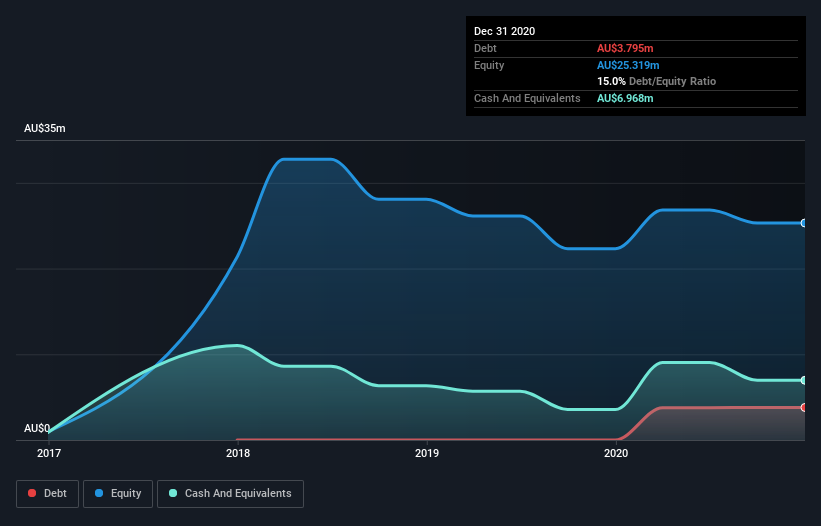David Iben put it well when he said, 'Volatility is not a risk we care about. What we care about is avoiding the permanent loss of capital.' When we think about how risky a company is, we always like to look at its use of debt, since debt overload can lead to ruin. As with many other companies Epsilon Healthcare Limited (ASX:EPN) makes use of debt. But is this debt a concern to shareholders?
Why Does Debt Bring Risk?
Debt and other liabilities become risky for a business when it cannot easily fulfill those obligations, either with free cash flow or by raising capital at an attractive price. In the worst case scenario, a company can go bankrupt if it cannot pay its creditors. While that is not too common, we often do see indebted companies permanently diluting shareholders because lenders force them to raise capital at a distressed price. Of course, the upside of debt is that it often represents cheap capital, especially when it replaces dilution in a company with the ability to reinvest at high rates of return. When we think about a company's use of debt, we first look at cash and debt together.
Check out our latest analysis for Epsilon Healthcare
How Much Debt Does Epsilon Healthcare Carry?
You can click the graphic below for the historical numbers, but it shows that as of December 2020 Epsilon Healthcare had AU$3.79m of debt, an increase on none, over one year. But on the other hand it also has AU$6.97m in cash, leading to a AU$3.17m net cash position.

How Strong Is Epsilon Healthcare's Balance Sheet?
According to the last reported balance sheet, Epsilon Healthcare had liabilities of AU$7.08m due within 12 months, and liabilities of AU$4.86m due beyond 12 months. Offsetting this, it had AU$6.97m in cash and AU$1.42m in receivables that were due within 12 months. So it has liabilities totalling AU$3.56m more than its cash and near-term receivables, combined.
Of course, Epsilon Healthcare has a market capitalization of AU$28.9m, so these liabilities are probably manageable. However, we do think it is worth keeping an eye on its balance sheet strength, as it may change over time. While it does have liabilities worth noting, Epsilon Healthcare also has more cash than debt, so we're pretty confident it can manage its debt safely. The balance sheet is clearly the area to focus on when you are analysing debt. But you can't view debt in total isolation; since Epsilon Healthcare will need earnings to service that debt. So when considering debt, it's definitely worth looking at the earnings trend. Click here for an interactive snapshot.
Over 12 months, Epsilon Healthcare reported revenue of AU$7.0m, which is a gain of 45%, although it did not report any earnings before interest and tax. With any luck the company will be able to grow its way to profitability.
So How Risky Is Epsilon Healthcare?
By their very nature companies that are losing money are more risky than those with a long history of profitability. And in the last year Epsilon Healthcare had an earnings before interest and tax (EBIT) loss, truth be told. Indeed, in that time it burnt through AU$9.9m of cash and made a loss of AU$11m. With only AU$3.17m on the balance sheet, it would appear that its going to need to raise capital again soon. Epsilon Healthcare's revenue growth shone bright over the last year, so it may well be in a position to turn a profit in due course. By investing before those profits, shareholders take on more risk in the hope of bigger rewards. The balance sheet is clearly the area to focus on when you are analysing debt. But ultimately, every company can contain risks that exist outside of the balance sheet. Case in point: We've spotted 5 warning signs for Epsilon Healthcare you should be aware of, and 2 of them are significant.
If you're interested in investing in businesses that can grow profits without the burden of debt, then check out this free list of growing businesses that have net cash on the balance sheet.
If you’re looking to trade Epsilon Healthcare, open an account with the lowest-cost* platform trusted by professionals, Interactive Brokers. Their clients from over 200 countries and territories trade stocks, options, futures, forex, bonds and funds worldwide from a single integrated account. Promoted
Valuation is complex, but we're here to simplify it.
Discover if Epsilon Healthcare might be undervalued or overvalued with our detailed analysis, featuring fair value estimates, potential risks, dividends, insider trades, and its financial condition.
Access Free AnalysisThis article by Simply Wall St is general in nature. It does not constitute a recommendation to buy or sell any stock, and does not take account of your objectives, or your financial situation. We aim to bring you long-term focused analysis driven by fundamental data. Note that our analysis may not factor in the latest price-sensitive company announcements or qualitative material. Simply Wall St has no position in any stocks mentioned.
*Interactive Brokers Rated Lowest Cost Broker by StockBrokers.com Annual Online Review 2020
Have feedback on this article? Concerned about the content? Get in touch with us directly. Alternatively, email editorial-team (at) simplywallst.com.
About ASX:EPN
Epsilon Healthcare
Operates as a healthcare and pharmaceuticals company primarily in Australia.
Medium and slightly overvalued.
Market Insights
Community Narratives



